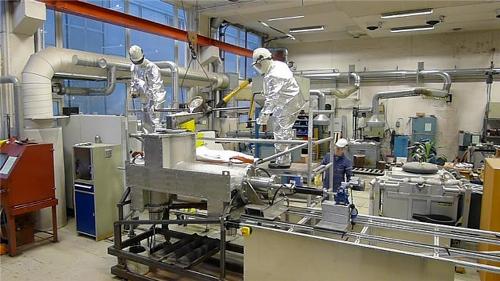Numerous projects across the globe have attempted to recycle and refine impure aluminium but have not been very successful. For over a decade, scientists at SINTEF have been working on their new apparatus to recycle and refine impure aluminium. They will however know the results by this May 2012.
 Wearing silvery heat-reflecting protective clothing, Arne Nordmark and Kurt Sandaunet of SINTEF Materials and Chemistry work on the aluminium recycling machine.
Wearing silvery heat-reflecting protective clothing, Arne Nordmark and Kurt Sandaunet of SINTEF Materials and Chemistry work on the aluminium recycling machine.
A 4 m-long machine dominates the laboratory hall of SINTEF Materials and Chemistry on Gløshaugen in Trondheim. Cables and pipework will be installed around this spring. On the top of the machine, molten contaminated aluminium will be poured, which will go through a refining procedure and come out as impure metal and pure aluminium via two outlets.
The machine’s left-hand side includes the purification system, wherein molten aluminium heated at 660oC is poured via an insulated pipe, which then passes through a horizontal channel. The machine is then slanted, wherein a graphite-based rotating screw balances the solidified crystals and forces pure aluminium in the upward direction to the hottest point, whereas the impurities remain in the cooler portion, whose temperature will be about 650oC. The screw is now placed on the skid that forms the machine’s right-hand side. About 40 heating elements have been fitted in various sections of the machine, which provide a complete temperature control for the scientists.
In the present scenario, around 9.9 million tonnes of scrap metal are being recycled each year across the globe, and such scrap will increase in the near future.
SINTEF’s Anne Kvithyld informed that Hydro strives to increase the level of recycling and purchases scrap metal from the merchants. However, scrap metal contains other metals like iron. Though some of this metal can be separated magnetically, some amount of residue still remains. Impure metal can be utilized in certain vehicle parts, but not in aluminium foil, which should be made strictly from pure aluminium. It therefore becomes essential to get pure products from such scrap metal.
However, when a metal is recycled, the quantity of superfluous elements also increases. This aspect forces the industry to add pure aluminium. Arne Nordmark, another scientist, said that the new refining furnace could help overcome this problem and deliver pure aluminium.
Hydro and the Research Council of Norway are providing additional support to the project. This May, about 50 kg of impure aluminium will be poured into the machine and this metal will be analysed by the researchers.
Arne Nordmark stated that the subsequent step will depend on the test results and the team will need to determine the right balance between the grade of purity and the time required to achieve the expected results.